MENU
(June 23, 2016 - by Ralph Kurtenbach) At a restaurant, they bowed their heads to pray for the victims of the April 16 earthquake that rocked Ecuador’s coast, and soon afterwards they put their hands to hammers and saws to help rebuild people’s homes.
A cell group from English Fellowship Church (EFC)* in Quito, they meet weekly at a local restaurant, Mister Bagel. In lighter moments—amid peals of laughter that often accompany their breakfast discussions—they refer to themselves as the “First Bagel Church.”
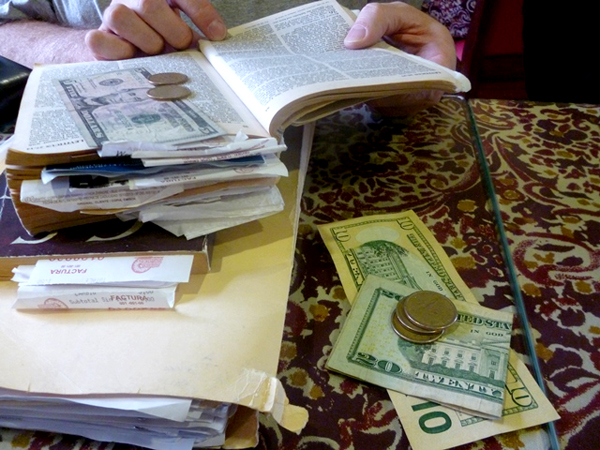 Ron Borman, an EFC elder, and engineer Jim Childs* most often lead a Bible lesson. No collection plate is passed, but some extra cash remains after Borman uses what people have laid on the table to cover breakfast costs.
Ron Borman, an EFC elder, and engineer Jim Childs* most often lead a Bible lesson. No collection plate is passed, but some extra cash remains after Borman uses what people have laid on the table to cover breakfast costs.
And so in discussing ways to help survivors of the 7.8-magnitude temblor, Childs reviewed their “bank” (bills tucked into Leviticus 26 in the Old Testament). Then he announced the amount to help to cover travel, food and board for the June 7-10 trip to Mompiche in Esmeraldas province. It amounted to several hundred dollars.
Prior to leaving Quito, Borman’s team received donations for rebuilding costs from different sources, including ministries that a decade or so ago were start-ups by Reach Beyond missionaries.
In the intervening years, the fledgling ministries have since taken flight on their own, including Extreme Response (led by Russ and Gina Cline* and Jerry and Dawn Carnill*) and Pan de Vida (Bread of Life, begun by Ecuadorian Oscar Aguirre and Canadian accountant David Tippitt*).
A U.S. group hosted by Don Wolfram* gave financial help as did Larry Salay who does Salasaca Quichua translation work.
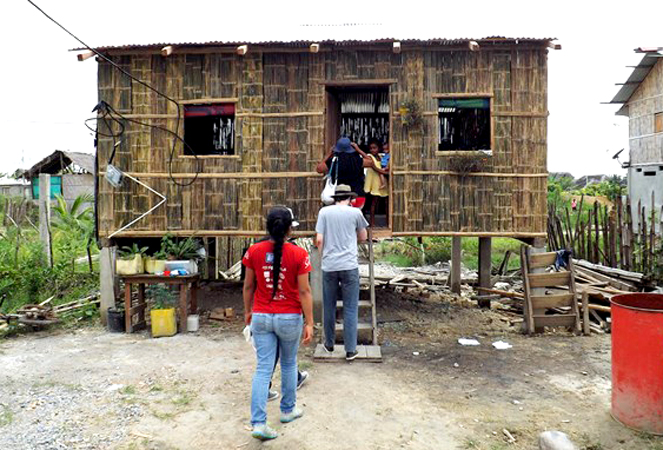 The six-person EFC team arrived in Mompiche three weeks after the coastal town had been jolted by a pair of 6.8-strength aftershocks on May 18. Their local contact was Emilio Velez, who pastors an Assemblies of God congregation in Mompiche.
The six-person EFC team arrived in Mompiche three weeks after the coastal town had been jolted by a pair of 6.8-strength aftershocks on May 18. Their local contact was Emilio Velez, who pastors an Assemblies of God congregation in Mompiche.
The work on rebuilding church members’ homes had already begun, and so the Quito group fell to work helping with construction. Even as tin-roofed homes of wood and bamboo were erected on concrete pylons that serve as a foundation, friendships were built.
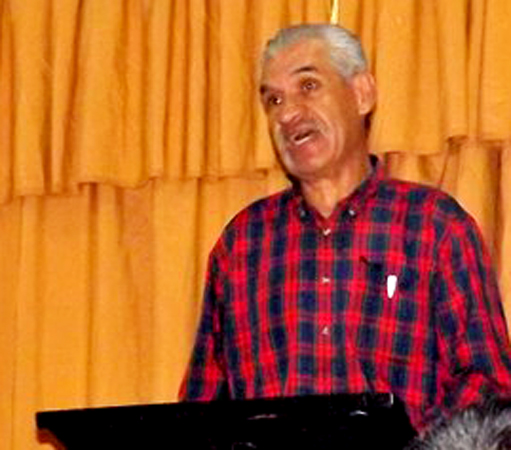 In the evenings they held church services. Preaching on the first night was by Germán Rhon* who founded and continues pastoring a Spanish-language congregation in Quito, Iglesia Nueva Creación (New Creation Church). Now-retired missionary Jim Estes* helped for several years in co-pastoring there. Rhon enjoys the Thursday bagel gatherings and was glad to transport the clothing in his 1977 Chevy van.
In the evenings they held church services. Preaching on the first night was by Germán Rhon* who founded and continues pastoring a Spanish-language congregation in Quito, Iglesia Nueva Creación (New Creation Church). Now-retired missionary Jim Estes* helped for several years in co-pastoring there. Rhon enjoys the Thursday bagel gatherings and was glad to transport the clothing in his 1977 Chevy van.
On another evening, the preaching was supplied by Borman’s friend, Ramón Umenda, from Sucumbíos province on the opposite side of the Andean mountain range. He looks after the spiritual needs of Christians from the Amazonian Cofán tribe in Sinangue.
When Borman asked Velez just how money raised by the Sinangue group could be used, he indicated that repairs to a fractured wall of the sanctuary would cost about what the Cofán group had brought.
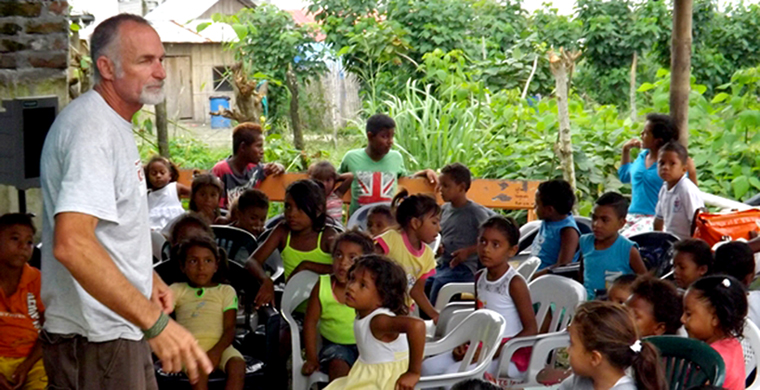 Borman, a missionary with Christian Missions in Many Lands, was pleased with the Cofanes’ vision to help other followers of Jesus. “It’s amazing,” he said, “because at Sinangue they haven’t finished their own church building yet.”
Borman, a missionary with Christian Missions in Many Lands, was pleased with the Cofanes’ vision to help other followers of Jesus. “It’s amazing,” he said, “because at Sinangue they haven’t finished their own church building yet.”
With the help of Rhon, Umenda and Nataly and Diana Bustamante (two Cofán associates) as well as working visitor Caleb Smith*, Borman’s time in Mompiche was instrumental in helping put up three new houses for members of the local Assemblies of God Church.
“Great to hear that First Bagel Church is going strong,” wrote Martin Harrison* upon reading an email message about the ministry trip to help quake victims. “I am a member too!”
Harrison and his wife, Ruth, helped Ecuadorians with clean water projects for several years before returning to their native England. They serve at Reach Beyond-UK’s office in Bradford, coordinating healthcare outreaches in the mission’s Europe/Eurasia Region.
*Indicates a person or entity with present or past ties to Reach Beyond. The story was written by Reach Beyond writer Ralph Kurtenbach, who worked in the Ecuador quake zone in May. He is a regular attendee at the Mister Bagel Bible studies.
First Person: Many Still Don’t Know Where to Rebuild, How to Move On
(June 23, 2016 - by Caleb Smith, working visitor, Reach Beyond)
We’re sitting in a one-room bamboo house and eating fish and rice as flies crowd the floor. The only light illuminating the table and food is a white fluorescent bulb. Lucy, the mother of the household, sits on the floor against the stove, tired from the long day, surrounded by her four children.
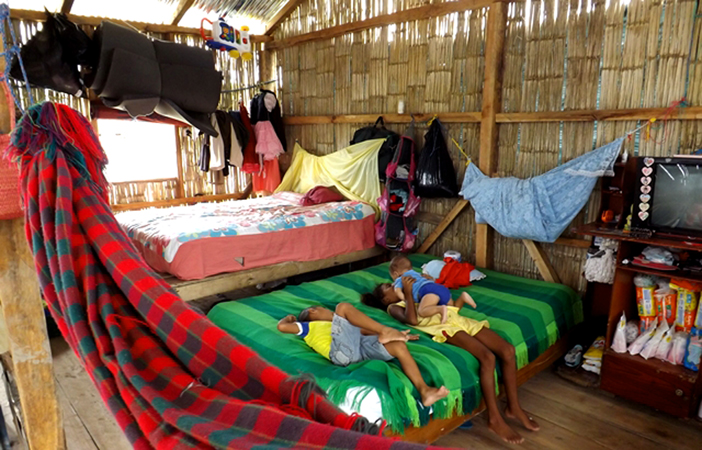 As she tells us about the condition of Mompiche after the earthquake, she rocks her 16-month-old child in one arm and rustles the hair of another child. She talks about the minute-long earthquake and how she grabbed her kids and ran outside, afraid her house would crumble. The house indeed did fall.
As she tells us about the condition of Mompiche after the earthquake, she rocks her 16-month-old child in one arm and rustles the hair of another child. She talks about the minute-long earthquake and how she grabbed her kids and ran outside, afraid her house would crumble. The house indeed did fall.
Lucy’s house has been rebuilt by the local Assemblies of God congregation, but she explains how many friends from church and around the area have not been able to find the help they need even weeks after the earthquake. Many of the people affected, she says, still don’t know what to do, where to rebuild, or how to move on.
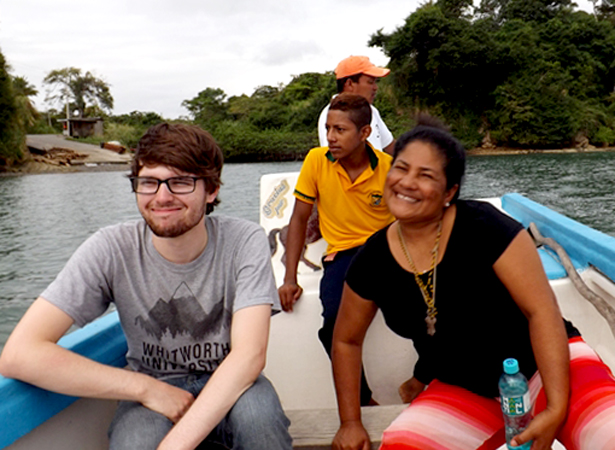 Driving into Mompiche, the only indications of an earthquake that we see are the blue temporary tents with Chinese characters on them. There are a few crooked buildings here and there, but everything appears normal for a small Ecuadorian coastal town.
Driving into Mompiche, the only indications of an earthquake that we see are the blue temporary tents with Chinese characters on them. There are a few crooked buildings here and there, but everything appears normal for a small Ecuadorian coastal town.
Life continues on at its normal pace as fishermen sew long white nets, children play in the muddy streets and people rest in the shade wherever it can be found. Talking to the residents of the town, we find that a number of houses have been hit and workers from the church are helping to rebuild those houses. We are told we need to visit an adjacent island, Muisne, in order to see the more drastic effects of the earthquake.
Driving down the road that runs out of town, we encounter a hotel resort with horses in the fields and air-conditioned houses. Our guide describes this as a “huge destination for tourists,” but the earthquake has almost totally halted business. Farther down, the road runs into a river, and we talk to some Ecuadorians who offer passage to the island. Piling into the boat we fight the river’s currents and land on a nice sandy beach (far nicer than the beach littered with dead crustaceans in Mompiche).
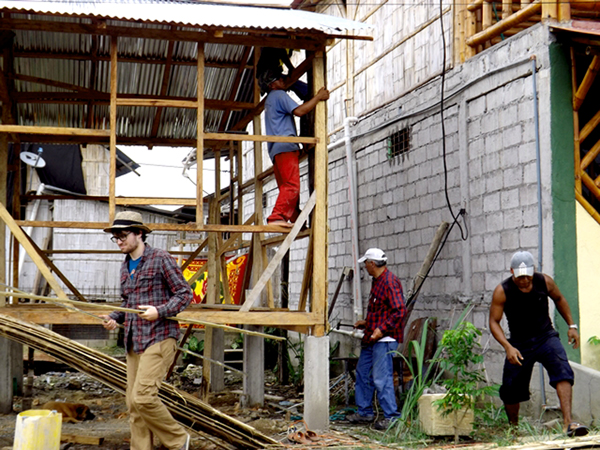 Walking along the beach, there are no signs that an earthquake occurred. In the distance the gaunt hotel we passed earlier sits across the river, facing the ocean. Walking farther inland away from the beach we can begin seeing the effects of the quake. Houses positioned along the coast—their foundations dug into the sand—are askew or fallen over. Our guide tells us about the poor construction location and the problems facing beach houses.
Walking along the beach, there are no signs that an earthquake occurred. In the distance the gaunt hotel we passed earlier sits across the river, facing the ocean. Walking farther inland away from the beach we can begin seeing the effects of the quake. Houses positioned along the coast—their foundations dug into the sand—are askew or fallen over. Our guide tells us about the poor construction location and the problems facing beach houses.
Gathering at the church, the people pray for deliverance as the leader of the church (not an ordained pastor) cries into his microphone for the glory of God to be seen in this place. In between his deep breaths the congregation whispers, “Gloria a Dios” (glory to God), “Amén” (amen) and “Santo eres” (you are holy). Leaving the church, we are greeted with an outpouring of love—hugs, handshakes and bendiciones (blessings). We leave for supper feeling welcomed as family.
Our days here are filled with construction and contemplation. Trying to help the construction teams with whatever can be done, I hand a worker a hammer or pass a long, crooked piece of wood from a bamboo tree.
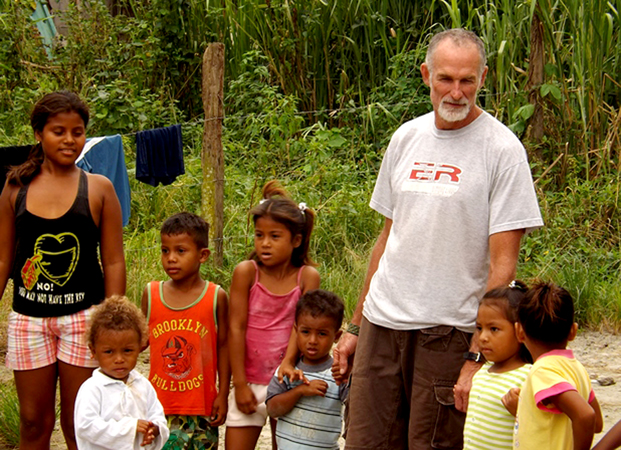 Holding an afternoon vacation Bible school, I take pictures of about 45 children singing songs, playing games and listening to stories in the church as each one of the team members leads a game, song or story.
Holding an afternoon vacation Bible school, I take pictures of about 45 children singing songs, playing games and listening to stories in the church as each one of the team members leads a game, song or story.
Sitting in the nearby benches, parents and teenagers watch their sons and daughters, brothers and sisters play, listen and smile. I ask one of the older kids if he wants to play Frisbee. He agrees, and we throw a Frisbee around in the sand street outside as the sun sets over the horizon, illuminating the sky in a brilliant flurry of orange and red.
Riding in the passenger seat on the way home, I can see the full effect of the earthquake in Pedernales. One of our team’s pastors says that this was the area hit hardest by the earthquake. On the outskirts of the city, we pass a massive resettlement camp with the same blue, Chinese-lettered tents. There must be close to 200 of them.
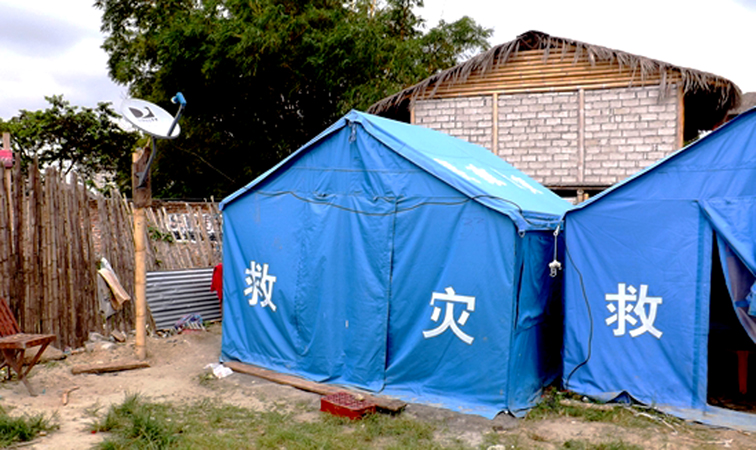 Driving into the city, we see rubble and piles of concrete everywhere; dust fills the air. In many of the now-empty lots, old pillars—the only remnants of buildings—jut out of the ground. Officers in bright yellow safety vests wait at just about every corner and crossing, directing traffic and sectioning off blocks of the city.
Driving into the city, we see rubble and piles of concrete everywhere; dust fills the air. In many of the now-empty lots, old pillars—the only remnants of buildings—jut out of the ground. Officers in bright yellow safety vests wait at just about every corner and crossing, directing traffic and sectioning off blocks of the city.
Looking down the alleys, we see a church with its roof caved in and exterior walls crumbled. It takes a while to get through the city because of all the roadblocks. We take two rights only to find out that we can’t take another. We backtrack, ask the officers where to go, and finally reach the outskirts of town on our way back to Quito.
On our way out, we stop and eat lunch in a small venue. The waiter brings us the lunch of the day, fritada (fried pork) with rice and a fried bananas, and she smiles and says welcome in Spanish. We eat slowly in the heat of the coast. As we leave, the pastor offers blessings.
Source: Reach Beyond
A cell group from English Fellowship Church (EFC)* in Quito, they meet weekly at a local restaurant, Mister Bagel. In lighter moments—amid peals of laughter that often accompany their breakfast discussions—they refer to themselves as the “First Bagel Church.”
 Ron Borman, an EFC elder, and engineer Jim Childs* most often lead a Bible lesson. No collection plate is passed, but some extra cash remains after Borman uses what people have laid on the table to cover breakfast costs.
Ron Borman, an EFC elder, and engineer Jim Childs* most often lead a Bible lesson. No collection plate is passed, but some extra cash remains after Borman uses what people have laid on the table to cover breakfast costs.And so in discussing ways to help survivors of the 7.8-magnitude temblor, Childs reviewed their “bank” (bills tucked into Leviticus 26 in the Old Testament). Then he announced the amount to help to cover travel, food and board for the June 7-10 trip to Mompiche in Esmeraldas province. It amounted to several hundred dollars.
Prior to leaving Quito, Borman’s team received donations for rebuilding costs from different sources, including ministries that a decade or so ago were start-ups by Reach Beyond missionaries.
In the intervening years, the fledgling ministries have since taken flight on their own, including Extreme Response (led by Russ and Gina Cline* and Jerry and Dawn Carnill*) and Pan de Vida (Bread of Life, begun by Ecuadorian Oscar Aguirre and Canadian accountant David Tippitt*).
A U.S. group hosted by Don Wolfram* gave financial help as did Larry Salay who does Salasaca Quichua translation work.
 The six-person EFC team arrived in Mompiche three weeks after the coastal town had been jolted by a pair of 6.8-strength aftershocks on May 18. Their local contact was Emilio Velez, who pastors an Assemblies of God congregation in Mompiche.
The six-person EFC team arrived in Mompiche three weeks after the coastal town had been jolted by a pair of 6.8-strength aftershocks on May 18. Their local contact was Emilio Velez, who pastors an Assemblies of God congregation in Mompiche.The work on rebuilding church members’ homes had already begun, and so the Quito group fell to work helping with construction. Even as tin-roofed homes of wood and bamboo were erected on concrete pylons that serve as a foundation, friendships were built.
 In the evenings they held church services. Preaching on the first night was by Germán Rhon* who founded and continues pastoring a Spanish-language congregation in Quito, Iglesia Nueva Creación (New Creation Church). Now-retired missionary Jim Estes* helped for several years in co-pastoring there. Rhon enjoys the Thursday bagel gatherings and was glad to transport the clothing in his 1977 Chevy van.
In the evenings they held church services. Preaching on the first night was by Germán Rhon* who founded and continues pastoring a Spanish-language congregation in Quito, Iglesia Nueva Creación (New Creation Church). Now-retired missionary Jim Estes* helped for several years in co-pastoring there. Rhon enjoys the Thursday bagel gatherings and was glad to transport the clothing in his 1977 Chevy van.On another evening, the preaching was supplied by Borman’s friend, Ramón Umenda, from Sucumbíos province on the opposite side of the Andean mountain range. He looks after the spiritual needs of Christians from the Amazonian Cofán tribe in Sinangue.
When Borman asked Velez just how money raised by the Sinangue group could be used, he indicated that repairs to a fractured wall of the sanctuary would cost about what the Cofán group had brought.
 Borman, a missionary with Christian Missions in Many Lands, was pleased with the Cofanes’ vision to help other followers of Jesus. “It’s amazing,” he said, “because at Sinangue they haven’t finished their own church building yet.”
Borman, a missionary with Christian Missions in Many Lands, was pleased with the Cofanes’ vision to help other followers of Jesus. “It’s amazing,” he said, “because at Sinangue they haven’t finished their own church building yet.”With the help of Rhon, Umenda and Nataly and Diana Bustamante (two Cofán associates) as well as working visitor Caleb Smith*, Borman’s time in Mompiche was instrumental in helping put up three new houses for members of the local Assemblies of God Church.
“Great to hear that First Bagel Church is going strong,” wrote Martin Harrison* upon reading an email message about the ministry trip to help quake victims. “I am a member too!”
Harrison and his wife, Ruth, helped Ecuadorians with clean water projects for several years before returning to their native England. They serve at Reach Beyond-UK’s office in Bradford, coordinating healthcare outreaches in the mission’s Europe/Eurasia Region.
*Indicates a person or entity with present or past ties to Reach Beyond. The story was written by Reach Beyond writer Ralph Kurtenbach, who worked in the Ecuador quake zone in May. He is a regular attendee at the Mister Bagel Bible studies.
First Person: Many Still Don’t Know Where to Rebuild, How to Move On
(June 23, 2016 - by Caleb Smith, working visitor, Reach Beyond)
We’re sitting in a one-room bamboo house and eating fish and rice as flies crowd the floor. The only light illuminating the table and food is a white fluorescent bulb. Lucy, the mother of the household, sits on the floor against the stove, tired from the long day, surrounded by her four children.
 As she tells us about the condition of Mompiche after the earthquake, she rocks her 16-month-old child in one arm and rustles the hair of another child. She talks about the minute-long earthquake and how she grabbed her kids and ran outside, afraid her house would crumble. The house indeed did fall.
As she tells us about the condition of Mompiche after the earthquake, she rocks her 16-month-old child in one arm and rustles the hair of another child. She talks about the minute-long earthquake and how she grabbed her kids and ran outside, afraid her house would crumble. The house indeed did fall.Lucy’s house has been rebuilt by the local Assemblies of God congregation, but she explains how many friends from church and around the area have not been able to find the help they need even weeks after the earthquake. Many of the people affected, she says, still don’t know what to do, where to rebuild, or how to move on.
 Driving into Mompiche, the only indications of an earthquake that we see are the blue temporary tents with Chinese characters on them. There are a few crooked buildings here and there, but everything appears normal for a small Ecuadorian coastal town.
Driving into Mompiche, the only indications of an earthquake that we see are the blue temporary tents with Chinese characters on them. There are a few crooked buildings here and there, but everything appears normal for a small Ecuadorian coastal town.Life continues on at its normal pace as fishermen sew long white nets, children play in the muddy streets and people rest in the shade wherever it can be found. Talking to the residents of the town, we find that a number of houses have been hit and workers from the church are helping to rebuild those houses. We are told we need to visit an adjacent island, Muisne, in order to see the more drastic effects of the earthquake.
Driving down the road that runs out of town, we encounter a hotel resort with horses in the fields and air-conditioned houses. Our guide describes this as a “huge destination for tourists,” but the earthquake has almost totally halted business. Farther down, the road runs into a river, and we talk to some Ecuadorians who offer passage to the island. Piling into the boat we fight the river’s currents and land on a nice sandy beach (far nicer than the beach littered with dead crustaceans in Mompiche).
 Walking along the beach, there are no signs that an earthquake occurred. In the distance the gaunt hotel we passed earlier sits across the river, facing the ocean. Walking farther inland away from the beach we can begin seeing the effects of the quake. Houses positioned along the coast—their foundations dug into the sand—are askew or fallen over. Our guide tells us about the poor construction location and the problems facing beach houses.
Walking along the beach, there are no signs that an earthquake occurred. In the distance the gaunt hotel we passed earlier sits across the river, facing the ocean. Walking farther inland away from the beach we can begin seeing the effects of the quake. Houses positioned along the coast—their foundations dug into the sand—are askew or fallen over. Our guide tells us about the poor construction location and the problems facing beach houses.Gathering at the church, the people pray for deliverance as the leader of the church (not an ordained pastor) cries into his microphone for the glory of God to be seen in this place. In between his deep breaths the congregation whispers, “Gloria a Dios” (glory to God), “Amén” (amen) and “Santo eres” (you are holy). Leaving the church, we are greeted with an outpouring of love—hugs, handshakes and bendiciones (blessings). We leave for supper feeling welcomed as family.
Our days here are filled with construction and contemplation. Trying to help the construction teams with whatever can be done, I hand a worker a hammer or pass a long, crooked piece of wood from a bamboo tree.
 Holding an afternoon vacation Bible school, I take pictures of about 45 children singing songs, playing games and listening to stories in the church as each one of the team members leads a game, song or story.
Holding an afternoon vacation Bible school, I take pictures of about 45 children singing songs, playing games and listening to stories in the church as each one of the team members leads a game, song or story.Sitting in the nearby benches, parents and teenagers watch their sons and daughters, brothers and sisters play, listen and smile. I ask one of the older kids if he wants to play Frisbee. He agrees, and we throw a Frisbee around in the sand street outside as the sun sets over the horizon, illuminating the sky in a brilliant flurry of orange and red.
Riding in the passenger seat on the way home, I can see the full effect of the earthquake in Pedernales. One of our team’s pastors says that this was the area hit hardest by the earthquake. On the outskirts of the city, we pass a massive resettlement camp with the same blue, Chinese-lettered tents. There must be close to 200 of them.
 Driving into the city, we see rubble and piles of concrete everywhere; dust fills the air. In many of the now-empty lots, old pillars—the only remnants of buildings—jut out of the ground. Officers in bright yellow safety vests wait at just about every corner and crossing, directing traffic and sectioning off blocks of the city.
Driving into the city, we see rubble and piles of concrete everywhere; dust fills the air. In many of the now-empty lots, old pillars—the only remnants of buildings—jut out of the ground. Officers in bright yellow safety vests wait at just about every corner and crossing, directing traffic and sectioning off blocks of the city.Looking down the alleys, we see a church with its roof caved in and exterior walls crumbled. It takes a while to get through the city because of all the roadblocks. We take two rights only to find out that we can’t take another. We backtrack, ask the officers where to go, and finally reach the outskirts of town on our way back to Quito.
On our way out, we stop and eat lunch in a small venue. The waiter brings us the lunch of the day, fritada (fried pork) with rice and a fried bananas, and she smiles and says welcome in Spanish. We eat slowly in the heat of the coast. As we leave, the pastor offers blessings.
Source: Reach Beyond
